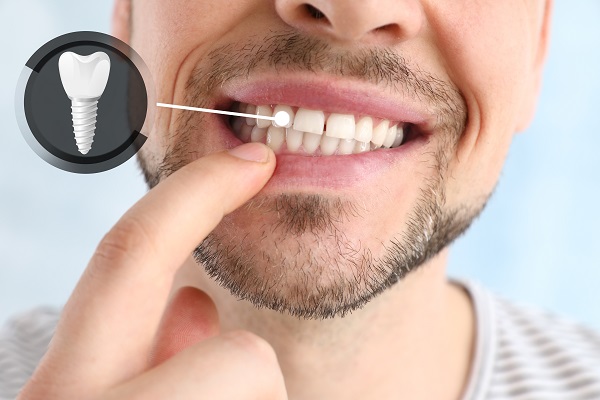What Foods Are Friendly to Dental Implants?

If you’ve lost a tooth, odds are you’ve at least looked into dental implants. They are one of the most popular alternatives to dentures or bridges. They are sturdier, more pleasant to look at, more pleasant to deal with, and have a tremendous success rate.
However, there is a bit of a time commitment. You’ll need to allow time to plan for the procedure and allow plenty of time for post-operative healing. To preserve the implant and ensure it lasts you years (or even a lifetime), you’ll need to practice excellent dental hygiene. Finally, you’ll need to exercise some care in the types of foods you eat—at least in the short term, after the procedure.
The dental implant procedure
First, understanding the procedure itself will help you understand why you’ll need to make some potential lifestyle changes in diet and hygiene. Dental implants are small metal rods that are surgically placed inside your jaw bone. The implants themselves are replacements for your tooth root, not your tooth itself. The implant is meant to fuse with your jaw bone and serve as an anchor for an artificial tooth.
Your surgeon will make a small cut into the gum to access the area of the jaw bone where the implant will be embedded. After the procedure, over a few months, your jaw bone will slowly grow around the implant, securing it in place.
What can I eat after a dental implant procedure?
While the success rate is high, like with many procedures, the post-operative period for dental implant surgery will be somewhat demanding. You’ll want to exercise excellent dental hygiene, as outlined by your dentist. Further, there are certain foods that you should avoid in the post-operative period.
Post-operative period
Bone healing takes time, likely months. During that time, you don’t want to eat or drink anything that will interfere with the healing process, hurt your tissues, or damage the implant. Your dentist and a team of providers will likely instruct you only to eat soft foods, certain cold foods, and things like warm soup.
This means avoiding hard foods like nuts, granola, apples, crusty bread, and more. You’ll likely need to avoid foods that require excessive chewing. Soft foods, like scrambled eggs and mac and cheese, might become your “go-to's” for a while. Your family dentist and surgeon will give you more post-operative instructions, including what to eat and what not to eat.
Long-term outlook
Finally, you may be wondering what foods to avoid in the long term. The short answer? None. A successful dental implant procedure will allow you to eat the foods that you usually enjoy. That is because the implant acts as a replacement for the tooth root—the anchor. Dental implants are durable, long-lasting, and will allow you to resume eating your favorite foods without facing pain.
After properly healing, you will likely be able to eat anything you want. There may be some minor exceptions, such as advice to avoid chewing on ice or hard candy, but that is due to the propensity of crowns/artificial teeth to break, which is otherwise great advice to anyone.
Request an appointment here: https://uptownnycdental.com or call Uptown Dental Group at (646) 666-0757 for an appointment in our New York office.
Check out what others are saying about our dental services on Yelp: Dental Implants in New York, NY.
Related Posts
Before the invention of dental implants, the only options available to replace a lost tooth were dentures or bridges. Today, dental implants offer a solution that looks and feels like a natural tooth. They are attractive and comfortable, and they provide many advantages.If you are considering replacing a lost tooth with an implant, there are…
A dental implant can support a replacement tooth. Dental implants provide a simple solution for replacing missing teeth. The procedure will leave you with a beautiful smile that looks and feels natural. If two or more of your teeth are missing, you may need multiple implants to solve this problem. Dental bridges and implants can…
Is it time for a smile makeover? If you look in the mirror and do not like your teeth, there are things you can do to change it. Your general dentist can offer various treatments and procedures to revive your smile and give you the appearance you have always wanted. Your dentist can discuss your…
For complete smile restoration, patients can undergo a full mouth reconstruction. Rather than treating one problem at a time, mouth reconstruction is a multi-faceted procedure for restoring your smile. Patients whose smiles are damaged or uneven may feel overwhelmed or even discouraged. Thankfully, modern dentistry offers many solutions for dental restoration.A full mouth reconstruction, or…
